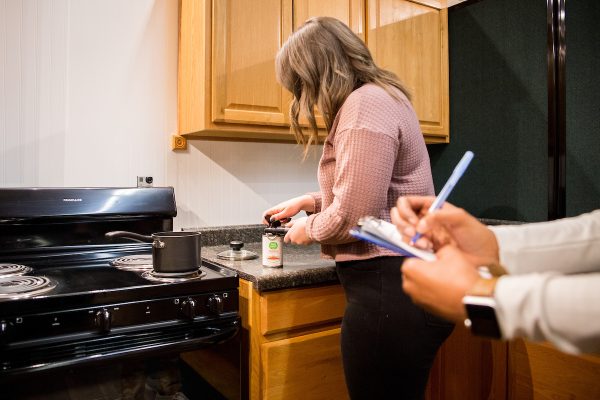The Department of Kinesiology hosts many research laboratories, where our faculty engages in scholarly inquiry and pursues research projects that advance knowledge within the kinesiology and occupational therapy fields. Whether you are a graduate or undergraduate student, there are opportunities to develop your research acumen working within these labs.
Kinesiology Labs
This is an accordion element with a series of buttons that open and close related content panels.
Exercise Physiology (Bruno Balke Biodynamics) Laboratory
The Bruno Balke Biodynamics Laboratory was named in honor of Bruno Balke (PhD, MD) in 2011 to honor the significant contributions Dr. Balke made to UW–Madison, the Madison community, and to the entire field of exercise physiology.
Bruno Balke Biodynamics Laboratory information
The Bruno Balke Biodynamics Laboratory includes a number of different labs.
Current Balke Biodynamics Lab research
Biodynamics Lab affiliates
Exercise Psychology Laboratory
Research in the Exercise Psychology Laboratory has generally been concerned with quantifying the psychophysiological responses to exercise and determining the neurobiological benefits of a physically active lifestyle.
Exercise Psychology Laboratory
The Exercise Psychology Laboratory includes a number of different labs.
Current Exercise Psychology Research Laboratories
Motor Behavior Laboratory
The Human Motor Behavior Laboratory is an active research environment in which faculty and students collaborate on projects aimed at gaining a better understanding of the planning and performance of simple and complex upper and lower limb activities in both natural and virtual environments.
Motor Systems Physiology Laboratory
The Motor Systems Physiology Laboratory focuses on understanding the neural control of reaching to grasp, which is essential to primate motor behavior and strongly depends on cerebellar function.
Neuromuscular Coordination Laboratory
The Neuromuscular Coordination Laboratory conducts fundamental research on the interactions between mechanics, neural control, and muscular coordination that allow humans and other animals to navigate their environments.
Physical Activity Epidemiology Laboratory
The Physical Activity Epidemiology Laboratory investigates the association between physical activity and cancer risk and survival, as well as how to measure and promote physical activity among cancer survivors and at-risk populations.
Wisconsin Injury in Sport Laboratory
Our research is focused on making sports safer for kids. Despite the well-documented benefits of sports participation, sport-related injuries are of the utmost concern because they can have a large impact on children quitting sports and ending participation in physical activity.
Occupational Therapy Labs
This is an accordion element with a series of buttons that open and close related content panels.
Ausderau Lab
Research in the Ausderau Lab focuses on studying daily occupations, specifically eating and mealtimes, among families and children with autism spectrum disorders to elucidate the impact on the child’s health, family wellness, and overall daily participation.
Edwards Lab
Dr. Edwards and her colleagues are using neurological, neuropsychological, occupational performance, and outcomes research methods to explore the effects of cognitive impairment and racial disparities in adults with stroke and Alzheimer’s disease.
Geriatric Health Services Research Lab
The Geriatric Health Services Research Lab engages in research that examines the quality, access, and outcomes of patient- and family-centered care approaches across the care continuum.
Larson Lab
Dr. Larson’s research investigates caregivers’ and students’ participation in daily activity as related to levels of well-being.
Motor and Brain Development Lab
The Motor Brain and Development Lab is dedicated to advancing knowledge about motor development, brain development, and independent living skills to promote and enhance quality of life for individuals with and without developmental disorders.
Sensory Motor Integration Lab
At the Sensory Motor Integration Lab (SMIL), our focus is on improving the everyday lives of older adults through the implementation of physical activity interventions—delivered in-home via telehealth and through group classes held at community-based facilities.
Additional Resources
Undergraduate Research Opportunities
Explore which labs offer opportunities for undergraduate and graduate students to participate in research.

